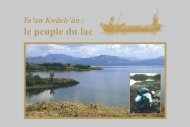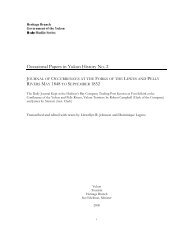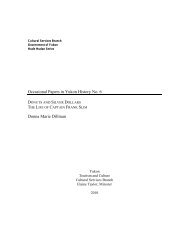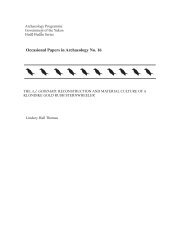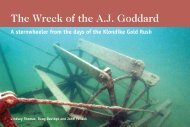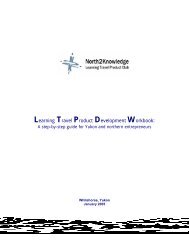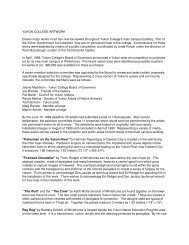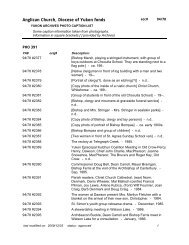Sustainable Tourism: The Tour Operators' Contribution
Sustainable Tourism: The Tour Operators' Contribution
Sustainable Tourism: The Tour Operators' Contribution
You also want an ePaper? Increase the reach of your titles
YUMPU automatically turns print PDFs into web optimized ePapers that Google loves.
4.5 Studiosus:<br />
Environmentally Friendly Transport Services<br />
Description of Good Practice<br />
In 1996, Studiosus Reisen, a German tour operator that specialises in<br />
educational tours, made an environmental ‘Declaration of Commitment’,<br />
signed by all employees (see Box 1). <strong>The</strong> Declaration is implemented<br />
through a series of specific, short-term goals. In the field of ‘product<br />
ecology’, nine goals were set in 1998 for the year 2000, including five aimed<br />
at providing more sustainable transport alternatives:<br />
• Decrease transportation energy (in megajoules) by 3 percent per traveller;<br />
• Achieve a 3 percent increase in the number of rail-and-fly tickets by improving the catalogue<br />
information about transport possibilities;<br />
• Increase the use of the train for reaching destinations in at least five European tours;<br />
• Extend train travel in EU countries from 11 percent by another 3 percent; and<br />
• Expand the range of the Studiosus ‘Stop the Engine’ campaign to include at least ten additional bus<br />
companies annually.<br />
Defining these transportation goals was part of an overall company process of creating an Environmental<br />
Management System (EMS) [See case study 1.4 for more on the Studiosus EMS]. <strong>The</strong> eco-audit process,<br />
a key element of the EMS, was helpful in defining these goals, because it allowed an assessment of their<br />
feasibility. Consultations with the internal eco-audit team, information dissemination to and involvement of<br />
the employees, and discussion with external consultants were all critical factors in defining goals and actions.<br />
poster from studiosus’ ‘fahreN & fliegeN’ campaigN<br />
Implementation<br />
Studiosus adopted several measures to implement the five transportation-related goals, including:<br />
• Decreasing transport energy through the use of non-stop flights, ferries instead of buses, public<br />
transport at destinations and reduction of internal flights within a destination;<br />
• Increasing the use of rail-and-fly tickets by incorporating them in the price of tours, establishing new<br />
contracts with local transport companies and with the German Federal Railway, and promoting their<br />
use through press releases and better presentation of information about these tickets in brochures;<br />
• Increasing the use of train journeys by adding five additional tours to destinations not currently<br />
<strong>Sustainable</strong> <strong><strong>Tour</strong>ism</strong>: <strong>The</strong> <strong>Tour</strong> Operators’ <strong>Contribution</strong> 3<br />
4. Product Management and Development




